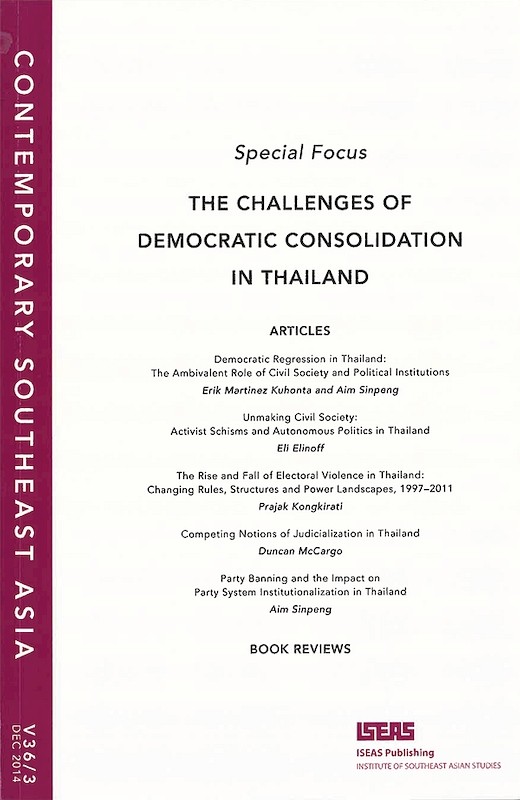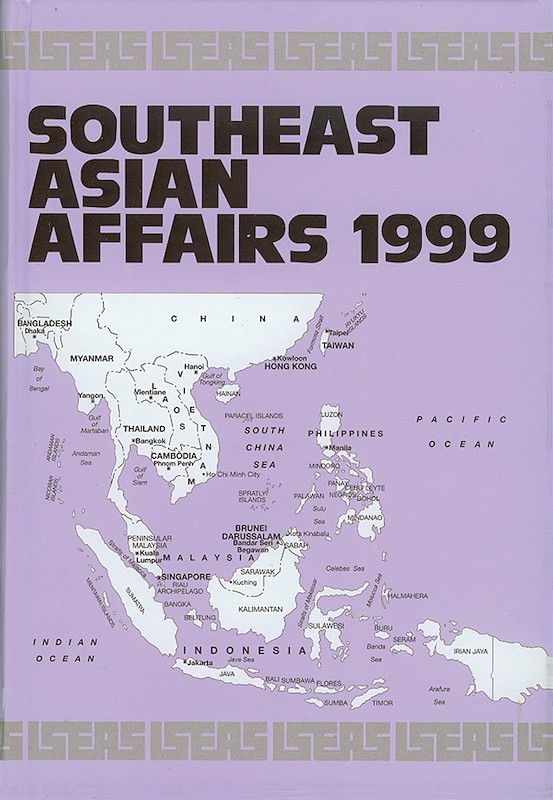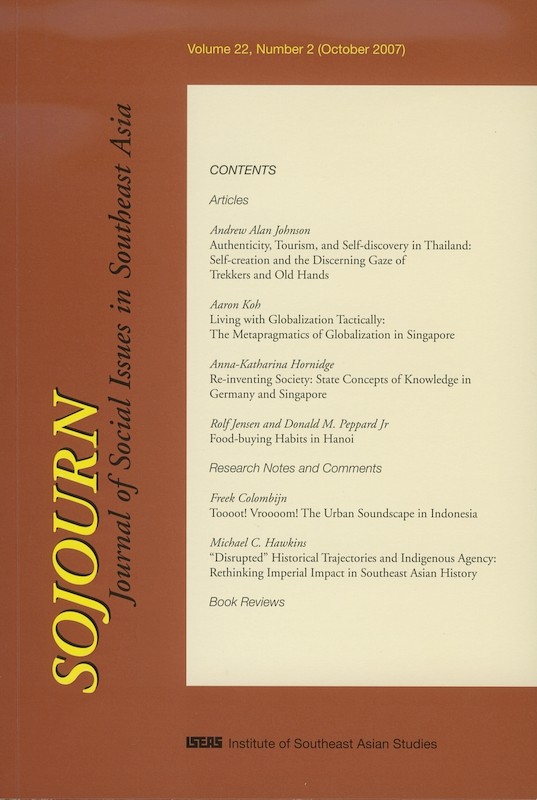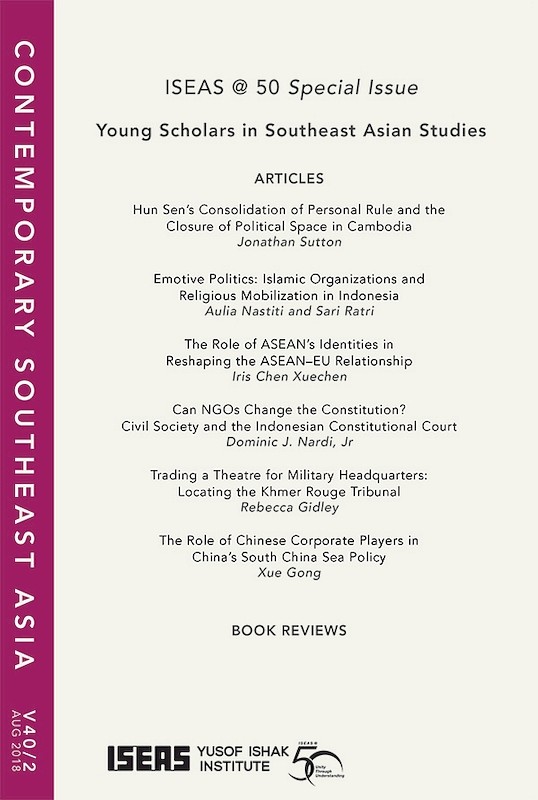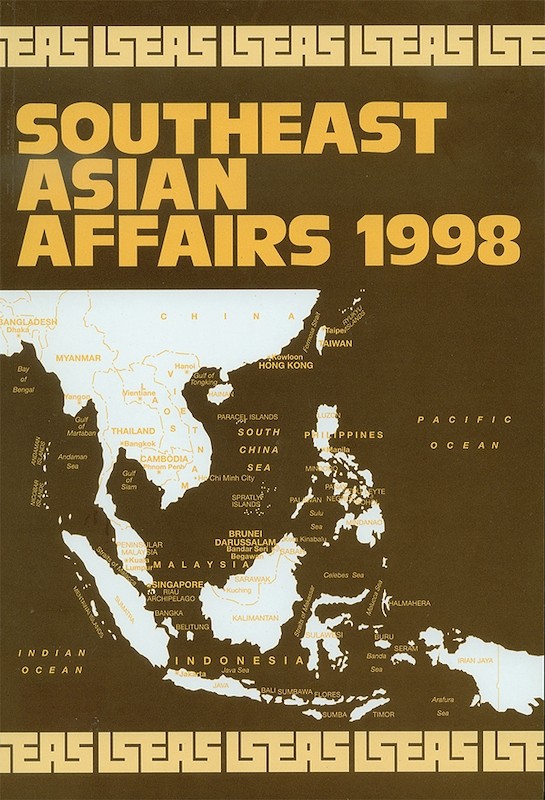SOJOURN: Journal of Social Issues in Southeast Asia Vol. 20/2 (October 2005). Special Focus on "Democracy and Civil Society: NGO Politics in Singapore"
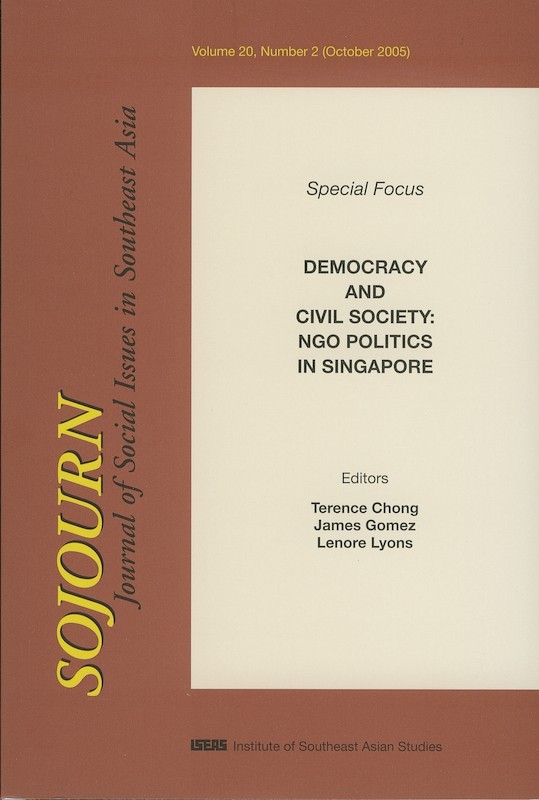
Date of publication:
September 2005
Publisher:
Institute of Southeast Asian Studies
Number of pages:
183
Code:
SJ20/2
Contents
-
SOJOURN: Journal of Social Issues in Southeast Asia Vol. 20/2 (October 2005). Special Focus on "Democracy and Civil Society: NGO Politics in Singapore"
-
Preliminary pages
- Introduction
-
Moving Beyond the OB Markers: Rethinking the Space of Civil Society in Singapore, by Lenore Lyons, James Gomez, authors
-
Gestural Politics: Civil Society in New Singapore, by Terence Lee, author see abstractThis paper offers a short history of the term and discourse of civil society in Singapore: from its promulgation by then Minister of information and the Arts (MITA) George Yeo as civic society (in the 1990s) to its reassertion as a government vision statement calling for active citizenship and public participation and feedback (from 1999). In 2004, in the lead-up to the installation of the city-states third Prime Minister, Lee Hsien Loong, civil society has been re-framed and re-branded with political buzzwords like openness and inclusiveness. This paper argues that while to some extent, engagement with the concept of civil society has become a political necessity in the new Singapore, the appropriation and propagation of such new rhetoric remains by and large gestural. In the final analysis, this paper posits that gestural politics where the liberal gestures of the regime is more important than its substance remains the most meaningful way of understanding the role and direction of civil society in Singapore.
-
Considering Green Practices: NGOs and Singapore's Emergent Environmental-Political Landscape, by Kersty Hobson, author see abstractAnalysis of proposed moves towards a more open Singaporean society must have as foundation detailed, qualitative explorations of ongoing sociopolitical practices and relations. This paper details such research undertaken with Singaporean environmental non-governmental organizations (NGOs) to examine their actions, motives, and impacts on the political landscape. It argues that NGO volunteers practices create distinct political spaces that embody desires to reconnect with, and imagine another Singapore into the future. At the same time, NGO interactions with the state and government are replete with double-edged ambiguities a state of affairs that could potentially undermine their contributions to effective Singapore governance if moves towards greater openness simply mean more of the same.
-
International NGOs: Filling the Gap in Singapore's Civil Society, by James Gomez, author see abstractThis paper looks at the role and impact of international NGOs on Singapore's civil society. It argues that since the mid-1990s the Internet has increased accessibility to information generated by such external organizations. In some ways, the Internet has spurred the development, growth, frequency, and reach of the work of these organizations thereby creating greater global and local awareness and activism of freedom concerns in Singapore. Such freedom concerns in particular focus on the lack of freedom of expression and media freedom in the Republic. The fact that on numerous occasions the Singapore government under the Peoples Action Party has taken issue with information put out by these organizations shows that the work of these external organizations does have an impact. Given that there is presently no consolidated local media advocacy initiative, these external groups play an important role in filling one gap in the local civil society landscape. However, the Internet and external input do not replace the need to have real local actors to move the media advocacy agenda forward in Singapore.
-
Transient Workers Count Too? The Intersection of Citizenship and Gender in Singapore's Civil Society, by Lenore Lyons, author see abstractIn November 2002, a group of Singaporean activists established a group called The Working Committee 2 (TWC2) to advocate for the rights of foreign domestic workers in Singapore. By limiting both its lifespan and the scope of its activities, the TWC2 avoided the requirement that all NGOs formally register under the Singapore Registrar of Societies. At the end of its year-long campaign, however, the group signaled its intention to continue with its advocacy work. The new TWC2 (now called Transient Workers Count Too) was registered in August 2004. For some commentators, the TWC2 represents a new phase in the Peoples Action Party's (PAP) engagement with Singapore's civil society experiment and a loosening up of the OB markers (boundaries marking politically acceptable activism). An examination of the TWC2s experience, however, shows that the opportunities for Singaporean activists to address the politically fraught issues of citizenship and gender remain little changed. Nonetheless, the TWC2s success in raising the profile of foreign domestic workers has brought about some significant improvements in the regulatory regime governing the conditions of maid employment.
-
State-Civil Society Relations and Tourism: Singaporeanizing Tourists, Touristifying Singapore, by Ooi Can Seng, author see abstractIn Singapore, the government has been able to close, absorb, re-define and open up civil spaces. The line separating state and civil society is blurred. This article examines how tourism in Singapore has not only played a central role in shaping Singaporeans own understanding of their national and ethnic identities, but it has also helped open up important civil and social spaces. This paper offers three examples the re-branding of Singapore, the decision to have two casinos in Singapore, and the promotion of educational and medical tourism. These examples demonstrate how various civil and social spaces are managed and transformed through the tourism industry. The government uses tourism resources to engineer local society to turn Singapore into a livelier and funkier city. By serving the interests of tourists, tourists have effectively become a civil group and constituency in Singapore.
-
Civil Society in Singapore: Popular Discourses and Concepts, by Terence Chong, author see abstractThis paper takes a critical look at various popular discourses and concepts found in the Singapore civil society literature. It finds many concepts in the literature to be dominated by the spectre of the state and the political acquiescence of the local middle class, both of which paint a picture of a weak and emasculated civil society. This picture, however, fails to capture pockets of passive resistance and contestations that may take place. The paper concludes by suggesting that Singapore civil society be examined as a series of reciprocal relationships between activists and state representatives situated in different locations of power and resources, who are able to engage with each other when their interests converge and disengage when they diverge.

